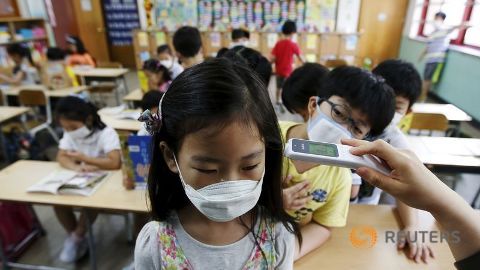Hong Kong issued a “red alert” advisory on Tuesday (June 9) against non-essential travel to South Korea, where eight new cases of Middle East Respiratory Syndrome (MERS) were reported bringing the total to 95 with seven fatalities.
The Travel Industry Council of Hong Kong has cancelled all tours to South Korea that were scheduled to set off between now and June 30, excluding cruises.
“I think for the month, whole month of June we have decided to cancel all the tours. Because I think the situation have, you know, sort of happened in the end of May. The number of tours definitely will not be as many as before already. But this time, I think we estimate we have to cancel about 600 to 700 group tours with about 12,000 passengers being involved,” said the Council’s Executive Director, Joseph Tung.
He said the industry welcomed the alert because it could now follow guidelines and negotiate compensation for lost cancellations.
On Monday (June 8), Hong Kong upgraded its response to the outbreak in South Korea to “serious” but without an official travel alert insurers are not compelled to pay out.
A red alert, the second-highest outbound travel advisory on a three-point scale, is defined as a “significant threat” according to the Hong Kong government, and means people should “adjust travel plans” and “avoid non-essential travel”.
“Unless it is absolutely necessary, Hong Kong people should temporarily cease to travel to South Korea for leisure or business,” Hong Kong’s number two official, Carrie Lam, told reporters just before the travel warning was posted.
General manger of travel agency Miramar Travel, Alex Lee, said that South Korea was the second most popular destination in Asia for Hong Kong travellers, spurred in recent years by pop-culture, cosmetics and shopping.
However, he said he was confident the cancellations would not run into peak holiday season.
“I don’t think so because I have the confidence that the South Korea government would know how to control it. And I expect after two weeks time, the MERS will be under controlled. And our summer holidays actually start in mid of July until end of August and I don’t think in that period the tours will still be affected,” said Lee.
However, some people were not taking any chances.
A 27-year-old research analyst, Walter Woo, said he remembered the seriousness of the SARS outbreak in Hong Kong in 2002 and was cancelling his upcoming holiday to South Korea.
“Seriously yes, I do scared about travelling over to Korea. Because I was planning to go to Korea like in a month time, like with my friends. But now I am cancelling it. I’ll have to do it today or tomorrow. It’s not just my decision. It’s all my friends and my family, they all care about me. I can go to Korea any time I want so it doesn’t have to be at this time,” said Woo.
The number of new South Korean cases was a sharp drop from 23 on Monday, but the number of schools closed grew to 2,208, including 20 universities.
The World Health Organization (WHO) began work on a joint mission with South Korean doctors and officials to review the country’s response and analyze the virus.
The WHO has not recommended any curb on travel, but thousands of tourists have cancelled plans to visit South Korea.
South Korea has the second highest number of infections, after Saudi Arabia, according to data from the European Center for Disease Prevention and Control.
The seventh reported MERS death in South Korea was a 68-year-old woman who had an existing heart ailment and had been in the emergency room of a Seoul hospital, where a number of previous confirmed cases had been traced.
The Chinese territory of Macau required masks for people entering local healthcare facilities as a precaution against MERS, and advised residents to avoid travel to South Korea unless absolutely necessary.
Some 2,892 people who may have had contact with MERS patients have been put under quarantine, some in hospitals but most at home. Authorities have said they are using mobile phones to track people who violate quarantine.
South Korea’s new cases bring the total of MERS cases globally to 1,244, based on WHO data, with at least 446 related deaths.









